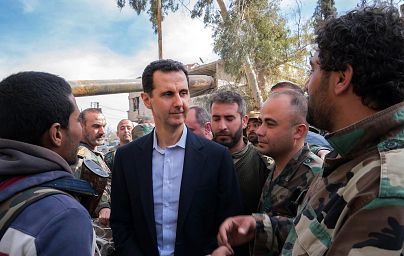Never has an administration been so consistently inconsistent on matters of national security, writes Col. Jack Jacobs.
There is a dynamic tension in every organization, and even a well-led White House has its flashes of conflict and even chaos. For example, although it was focused intensely on the single objective of winning the Civil War, the Abraham Lincoln presidency was riven with rivalries, jealousies and disorganization. Still, the Trump White House seems to be the textbook example of dysfunction.
Fulfilling President Donald Trump's hyperbolic campaign promises has proved to be a very difficult task indeed. Most recently, his pledge to build a border wall funded by Mexico has resulted in essentially the same decision that has been made by previous administrations: sending a few National Guard troops to provide aviation, administration, logistical and intelligence support.
But perhaps this administration's most striking inconsistency has been regarding America's role and attitude towards Syria. On March 29, Trump stated unequivocally that he wanted our troops out of Syria "very soon." Meanwhile, several senior officers, including Army Gen. Joseph Votel, who is responsible for the region, noted that in fact "the hard part, I think, is in front of us, and that is stabilizing these areas, consolidating our gains, getting people back into their homes."
This is not the first time that an extemporaneous pronouncement from Trump has seemed to be at odds with the opinions of senior officials. But never has an administration been so consistently inconsistent on matters of national security.
Soon after Trump's comment about leaving Syria, President Bashar al-Assadallegedly gassed to death dozens of Syrians (again). Trump responded by tacitly reneging on his pledge to disengage from Syria and announcing that he was meeting with his generals to discuss "making some major decisions in the next 24 to 48 hours."
If history is any guide, it is likely Trump will launch missile strikes against a few Syrian airfields and perhaps at Syrian command-and-control headquarters. After all, this week marks almost exactly one year since Trump launched 59 Tomahawk cruise missiles at Syria in response to another chemical weapons attack. But it is just as likely that Assad will shrug such actions off and carry on with his atrocities, much the same as he has since the insurrection began seven years ago. Assad, Russia and Iran are in it for the long haul, and we are not.
So what, if anything, is to be made of the Syrian mess and our role in it? Perhaps it is worthwhile to examine briefly how the United States got to this point in the first place.
The U.S. was originally vociferous about its opposition to the Assad regime and publicly supportive of the multifarious forces in rebellion to it. President Barack Obama argued that Assad must resign, and announced that Assad's further use of chemical weapons would not be tolerated. With perhaps a better understanding of American political will than Obama had, however, Assad promptly used chemical weapons again — and America did nothing but complain.
Whether or not you agree with an isolationist — at least hands off — foreign policy, it seems clear that nations should not make threats about punishment without the will to follow through.
As Russia and Iran became more and more involved in the fray between 2013 and 2015, America became even more skittish. Wanting to keep its hands as clean as possible, the Pentagon's brain trust shifted its objective to eliminating ISIS, which had taken up residence in a country only partially controlled from Damascus.
America sent troops to train indigenous Syrian rebel forces, but the greatest battlefield successes were spearheaded by Kurdish allies. Their determination, and America's devastating airpower, proved to be a lethal combination. The dreams of ISIS leaders to occupy territory and create a "caliphate" eventually made the organization easier to locate and destroy, and it is now nearly eliminated as a military force in Syria.
Now Kurds themselves are being targeted, by Syrian allies Russia and Iran but and also by Turkey — an American NATO ally, in theory at least — which views the Kurds as a terrorist organization. This means that when America does leave Syria, the Kurds will be on their own. Without American forward air controllers and air support, they will have a very unpleasant time.
More troubling, ISIS could become a resurgent force in the large swaths of Syria that Assad can't dominate and the U.S. has vacated. In this worst-case scenario, all of our efforts will have been in vain.
And Russia and Iran? They have different, but complimentary, objectives. Russia wants influence in the region, but what it really loves is warm-water ports in the Mediterranean. Access via the Black Sea is controlled by the Turks at the Bosphorus, making control of Syrian coastline a tantalizing prospect. America and Turkey are on the outs at the moment, but in a pinch Russia can't trust the Turks to let it through the strait.
The perception that America can project its power at will remains a pervasive one stateside — including in Washington. And occasionally it has, for good and ill. But the world has changed dramatically since the war in Vietnam, the Soviet Union dissolved and the U.S. became complacent about its technology and the purity of our democracy.
Syria may seem like an underdeveloped country whose fate is not the least bit connected to ours. Perhaps the same is true of Afghanistan or Africa.
But don't bet on it.
Retired Colonel Jack Jacobs earned the Medal of Honor for exceptional heroism on the battlefields of Vietnam. He also holds three Bronze Stars and two Silver Stars. Jacobs is a member of the Council on Foreign Relations and a military analyst for NBC/MSNBC. His memoir, "If Not Now When?: Duty and Sacrifice in America's Time of Need," won the 2010 Colby Award.
Opinions expressed in View articles are not those of euronews.


